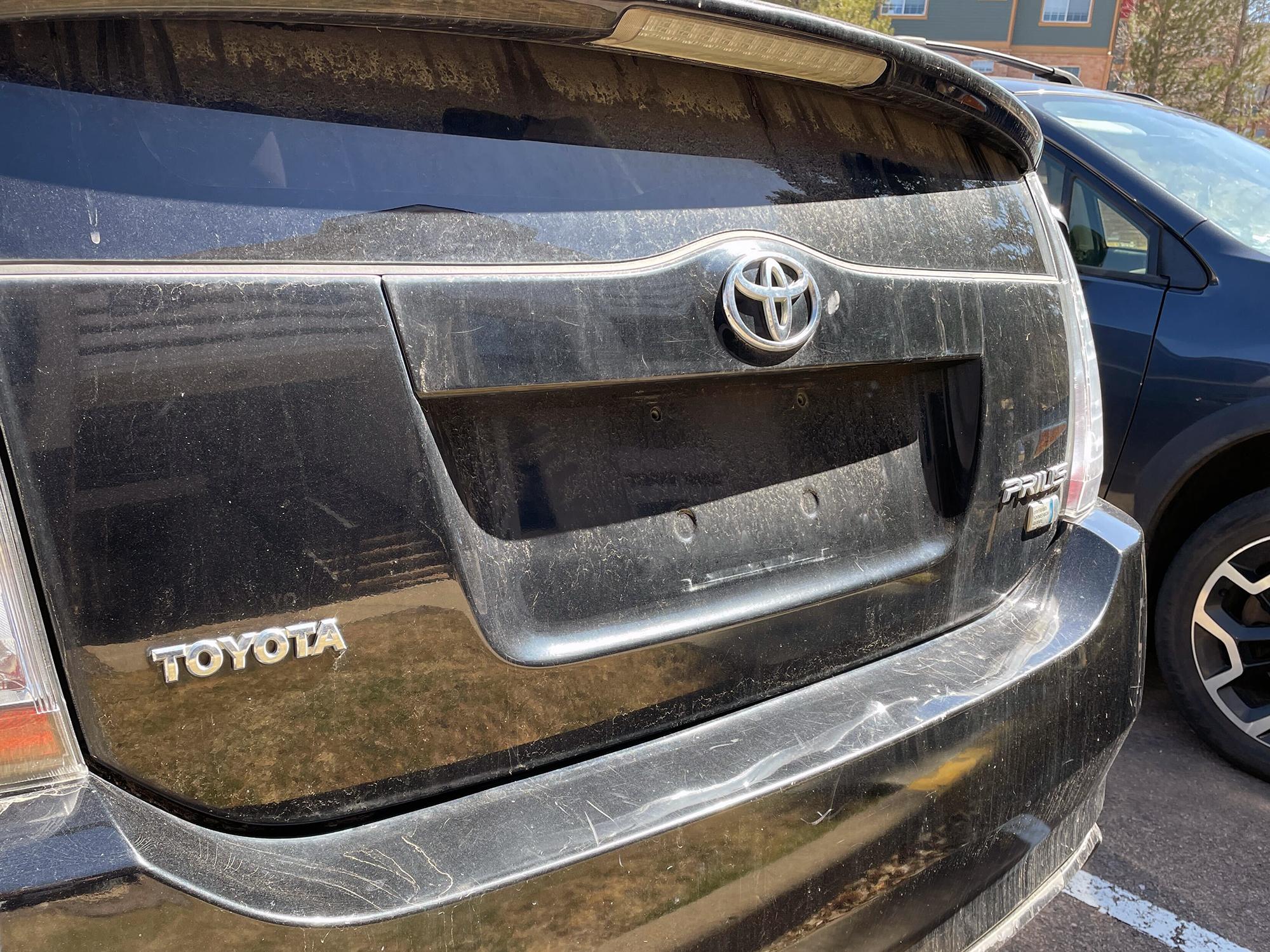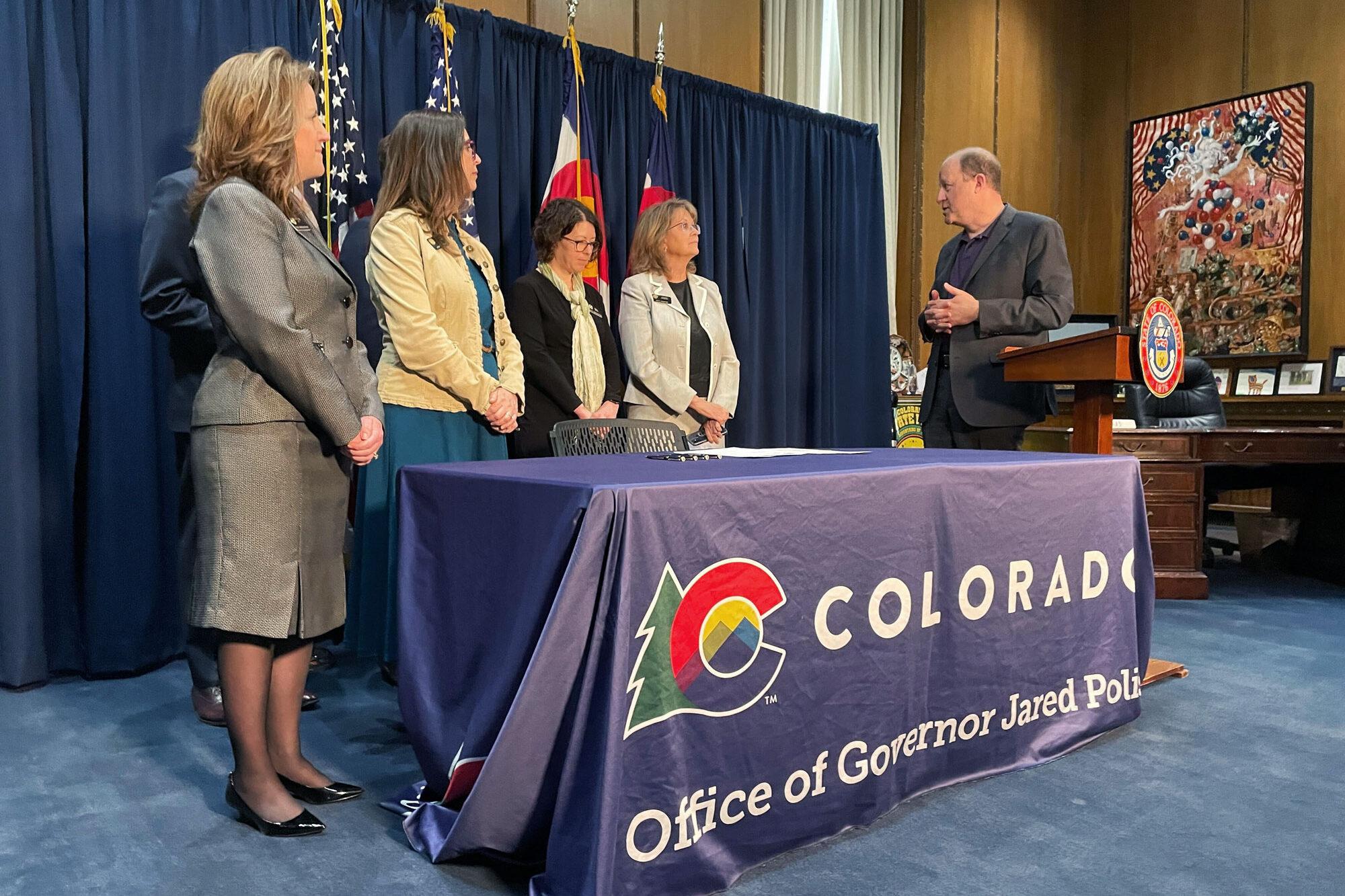
Updated March 20, 2023 at 9:50 a.m.
Theodore Shille was driving home from the grocery store when he noticed something. During the short trip, he passed three cars that had expired temporary license plates or no plates at all.
It wasn’t the first time he had seen this near his Denver home; a few days before he wrote in to CPR News and asked, “what’s the deal with all the cars driving around without a license plate, or with an expired temporary plate?”
It’s a question that regularly appears on a local Reddit message board.
And it’s something this reporter has seen, as well. When I started looking into this story, I stood at a busy intersection in Westminster near the entrance to U.S. 36 on a Sunday morning to count the number of cars I saw with expired temporary license plates or no plates. Within 10 minutes, I saw 10 cars.
Why are there so many cars on Colorado roads with expired plates? At the beginning of the COVID-19 pandemic, before vaccines were readily available, county Department of Motor Vehicle offices were closed frequently and experienced supply chain issues for materials needed to make the plates. Could that still be affecting permanent license plate turnaround times? Are drivers lax in getting their plates updated, or is something else happening?
‘Every deal is different’
According to Adam Wilms, director of vehicle services at the state DMV, that early pandemic slowdown has come and gone.
“You'll see appointments ranging from same day to, I would say, a max of three or four days out,” he said.
But that only covers one aspect of the process to acquire permanent plates. It really begins once someone purchases a vehicle from a dealership.
After all the forms are signed, the dealer has 30 days to forward the title paperwork to your county DMV office for processing. Jessica Ramirez, who manages titles for GoJo Auto in Denver, said this part usually goes smoothly for her, but there are exceptions.
“Every deal's different. I have three right now that aren't good,” Ramirez said. “Sometimes it's a trade-in and we pay out the lien and the bank doesn't send us the title. Or it gets lost in the mail, so I have to wait for a lien release and then get a duplicate title. There's lots of things that could delay it.”
The county DMV has 30 days after it receives the title to process the paperwork and send the buyer a “Title Complete Notice” via mail. Ramirez said she heard from the people she sends paperwork to that there are potential slowdowns there, as well.
Derek Kuhn, a spokesperson for the state DMV, said that all Colorado counties should be caught up on title processing by now, except for one.
“Our team confirmed that Denver County DMV is running behind on processing title paperwork, but we believe they should be caught up in a couple of weeks,” he said.
Department spokesperson Courtney Meihls said the Denver County DMV wait time is currently 30 days: "Denver is experiencing a backlog due to staffing issues, and because our branches operate differently than other [motor vehicle] branches throughout the state.”
If drivers don't receive their permanent plates within by the time the temporary plates expire, Meihls continued, the DMV branches will provide extended temporary plates.
After the local DMV mails that Title Complete Notice, the process to get permanent plates varies by county. In Denver County, for example, buyers can either register their vehicle over the phone or visit a branch office. Buyers may be required to bring documentation, like proof of ownership and insurance, into their local DMV office.
All that’s left to do is pay for registration fees, which can vary depending on the age, weight and value of the vehicle. Fees can amount in the low hundreds, while some vehicles may garner a final fee of well over $1,000. Fees help pay for vital infrastructure across the state.
“What most people don't realize is that a significant portion of [registration fees] goes to the county, so that pays a lot of your county taxes,” Wilms said. “In addition to that, it's your road and bridge taxes and fees. A lot of the money goes to the highway user tax fund and funds the repairs and the creation of our roads and bridges throughout Colorado.”
‘That’s when everything started to falling to pieces’
The road to obtaining permanent plates should take 60 days, at most. But for Kyle Spence, it took six months.
“As soon as I actually purchased the car and left with it, that's when everything started falling to pieces,” Spence said.
When his first set of temporary tags expired in November, he called his dealership, a national chain, in Thorton which told him they hadn’t submitted any documents to the state.
“They never really gave me a reason for it,” he said.
By January, Spence’s second set of temporary tags were due to expire, and he hadn’t received the Title Complete Notice from the DMV. So, he took matters into his own hands.
“There's a way that you can look up your VIN number of your vehicle, [and] whether or not you have a title number,” he said. Spence took the title number to the tax collector’s office without his Title Complete Notice and eventually got his permanent plate. He acknowledged, however, that persuading the office to go through the process without the notice was difficult.
For Kate McElhaney, the road to permanent plates has been similarly rocky. In November, she bought an electric vehicle and by February, she was still waiting to obtain permanent plates.
“I don't know where the holdup is. Is it with the dealership? Is it with the DMV? I'm not really sure,” she said.
Neither her dealership nor the DMV have answered her questions. And with the tax deadline quickly approaching, she isn’t sure how to file to get the state’s electric vehicle tax credit.
“If I don't get my car registered until after April 15th, what does that mean?” she asked. “Do I just surrender my tax credit or can I go for it in this calendar year? I don't know and I can't really find any information on that.”
‘He said, you just drive around with expired tags.’
But what about people driving around with long-expired temporary plates, or cars with no plates?
Until recently, Colorado only penalized people with expired vehicle registration. But earlier this month, a new law went into effect that aims to reduce the number of cars with expired temporary license plates by introducing new fines to people late with the registration of their temporary plates, as well as permanent ones.
In response to the DMV’s renewed hard stance on all unregistered vehicles, some state law enforcement agencies said they would take more consistent action against cars with expired plates or no plates.
Colorado State Patrol, the Douglas County Sheriff’s Office, and other police departments recently said they will begin pulling people over for unregistered vehicles.
The Denver Police Department, however, signaled that unregistered vehicles are low on their priority list.
“Consistent with our commitment to Vision Zero, Denver Police Officers generally focus on safety violations when conducting traffic enforcement. When they are not responding to reports of crime, officers are encouraged to engage in proactive efforts, to include enforcing traffic and parking violations,” DPD said in a statement.
Police departments aren’t the only entity with the authority to enforce registration laws. In Denver, a division of the Department of Transportation and Infrastructure handles parking violations and citations around the city.
That division — the Right of Way Enforcement — issued about 92,000 citations in 2022 to cars breaking municipal code 54-62, which prohibits having either an expired license plate or no front license plate. That’s about 7,000 more citations than were issued in 2019.
John LeDrew has received several of those tickets.
About a year ago, he began leasing a plug-in hybrid and has been driving with expired temporary license plates since they first expired. He wasn’t told by his dealership or the DMV that he could obtain more temporary license plates.
“I did the calculation, the fees were like $600. I went [to the DMV] to register and get those tags, but it turned out to be closer to $1,400,” LeDrew said. “I couldn't afford that at the time. So, I asked what my options were and he said, ‘you just drive around with expired tags.’ I said, ‘alright, cool.’ And I just left.”
LeDrew has been trying to save up to afford his permanent plates, but owning a small business and having a commission-based salary makes his finances difficult to predict. He believes he’s close, but more tickets could set him back.
“It's just one of the constant battles we have to manage,” he said.
Editor's note: This story has been updated with a comment from Denver's DMV spokesperson.








